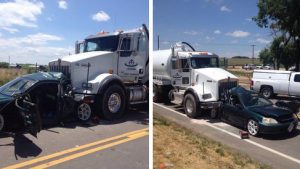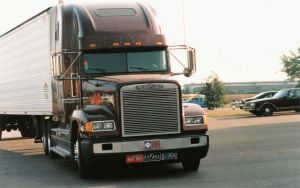The tragic deaths of five young women on Interstate 16 recently is a stark reminder of the dangers that tractor-trailers pose to all drivers on Georgia highways. Five Georgia Southern University nursing students, riding in two cars, died when a tractor-trailer failed to stop for traffic slowed by a prior accident on I-16 in Bryan County during the early morning hours of April 22, 2015. Two other students were injured. The GSU students were on their way to their last day of clinical rotations at a Savannah hospital. Sadly, this tragedy might have been avoided with the use of “crash avoidance” technology on tractor-trailers. Forward collision avoidance and mitigation technology is already fully-developed and comes as a standard feature on many new automobiles. This life-saving technology works by taking over the brakes and engine of the tractor-trailer when an imminent collision is anticipated and alerting the driver to the danger. Many systems brake the vehicle autonomously if the driver does not respond. An auto brake system may not always be able to prevent a crash, but it can reduce the vehicle speed, mitigating the severity of the crash and injuries caused thereby.
Not only is forward crash avoidance technology available, studies have shown that it can prevent collisions and fatalities. The National Highway Traffic Safety Administration (NHTSA) is the U.S. government agency whose mission is to achieve “the highest standards of excellence in motor vehicle and highway safety.” NHTSA is well aware of the existence and effectiveness of forward collision avoidance technology. It estimates that current forward collision avoidance technology could prevent over 2,500 crashes each year and future generation systems could prevent over 6,300 crashes annually. In Australia, that country’s equivalent of our Department of Transportation investigated forward collision avoidance technology. A detailed study of Australian crashes found that the use of such technology would have resulted in a 20-40% reduction in the number and severity of fatal crashes and a 30-50% reduction of injuries. In light of such evidence, one must question why NHTSA has failed to move forward and require that this basic crash avoidance technology be installed on all tractor-trailers. Estimates of the cost to retrofit current tractor-trailers to meet this standard are in the range of $500 per truck. This cost pales in comparison to the costs and consequences of lost lives and severe injuries resulting from tractor-trailer collisions.
According to the U.S. Department of Transportation, there are nearly 100,000 injuries and 4,000 deaths annually on U.S. highways as a result of tractor-trailer collisions. In 2013, 97% of those killed in two-vehicle crashes involving a large truck and a smaller passenger vehicle were the occupants of the smaller automobile. Georgia is currently among the top five states in the U.S. in truck-related fatalities. Steve Owings is the President and Co-Founder of Road Safe America. Mr. Owings lost his son, Cullum, when the car Cullum was driving was barreled into from behind, in stopped traffic, by a tractor-trailer. Road Safe America, joined by the Georgia Trial Lawyers Association and other highway safety groups, is calling on Congress and NHTSA to require forward collision avoidance technology on all current and future tractor-trailers. Last week’s heartbreaking wreck is another example of the tragedy that can occur when a truck driver is distracted or otherwise not alert. It is time that the trucking industry implemented the technology that is already available to take over and avoid a collision when a fatigued and distracted truck driver does not do so manually. Savannah native Abbie Deloach, Emily Clark, Morgan Bass, Catherine McKay Pittman, and Kaitlyn Baggett were, by all accounts, outstanding young women with promising careers and lives ahead of them. Let’s honor their memories by demanding that Congress and NHTSA immediately require the installation and use of forward collision avoidance technology on all tractor-trailers.
 the truck driver was talking on his cell phone. The company, Unify, Inc., is a yarn manufacturer that has 60 trucks traveling across U.S. highways. At the time of the collision, Unify had a company policy allowing its drivers to use their cell phones for a maximum time period of two minutes while they were operating company trucks. Lawyers for the injured couple contended the company’s policy promoted dangerous behavior, as Unify failed to enforce the policy. The at-fault driver’s cell phone logs showed that he would routinely use his cell phone for periods as long as seven hours during an approximate eight hour driving shift. Other evidence produced during the case showed that other Unify truck drivers also violated the company policy.
the truck driver was talking on his cell phone. The company, Unify, Inc., is a yarn manufacturer that has 60 trucks traveling across U.S. highways. At the time of the collision, Unify had a company policy allowing its drivers to use their cell phones for a maximum time period of two minutes while they were operating company trucks. Lawyers for the injured couple contended the company’s policy promoted dangerous behavior, as Unify failed to enforce the policy. The at-fault driver’s cell phone logs showed that he would routinely use his cell phone for periods as long as seven hours during an approximate eight hour driving shift. Other evidence produced during the case showed that other Unify truck drivers also violated the company policy. Georgia Injury Lawyer Blog
Georgia Injury Lawyer Blog


 overstated. Often, key evidence exists on an onboard computer on the truck and also in paperwork required to be maintained by truck drivers and trucking companies.
overstated. Often, key evidence exists on an onboard computer on the truck and also in paperwork required to be maintained by truck drivers and trucking companies. Fatigue and lack of sleep while driving an 18 wheel tractor-trailer rig can cause accidents and deaths on the highways. Under the existing rules that govern trucking companies, these companies can compel their drivers to drive up to 11 hours in a 21 hour time period. Drivers are allowed to drive up to 88 hours in an 8 day period. Whereas most people work a 40 hour week, current rules governing truck drivers allow them to cram more than 2 weeks of work (driving) in slightly over 1 week. This inevitably results in truck drivers driving for very long periods without adequate time off to rest. That, in turn, can lead to fatigue and other symptoms caused by sleep deprivation. 65% of truck drivers have reported feeling tired or drowsy while driving. Astonishingly, 48% of truck drivers have reported that they have fallen asleep while operating an 18 wheeler. The legal weight for an 18 wheeler is 80,000 (40 tons). By comparison, the average weight of an automobile is slightly over 5,000 pounds. One can imagine the devastation that can result when an 18 wheeler weighing 80,000 pounds and being driven by a sleepy driver collides with an automobile weighing 5,000 pounds.
Fatigue and lack of sleep while driving an 18 wheel tractor-trailer rig can cause accidents and deaths on the highways. Under the existing rules that govern trucking companies, these companies can compel their drivers to drive up to 11 hours in a 21 hour time period. Drivers are allowed to drive up to 88 hours in an 8 day period. Whereas most people work a 40 hour week, current rules governing truck drivers allow them to cram more than 2 weeks of work (driving) in slightly over 1 week. This inevitably results in truck drivers driving for very long periods without adequate time off to rest. That, in turn, can lead to fatigue and other symptoms caused by sleep deprivation. 65% of truck drivers have reported feeling tired or drowsy while driving. Astonishingly, 48% of truck drivers have reported that they have fallen asleep while operating an 18 wheeler. The legal weight for an 18 wheeler is 80,000 (40 tons). By comparison, the average weight of an automobile is slightly over 5,000 pounds. One can imagine the devastation that can result when an 18 wheeler weighing 80,000 pounds and being driven by a sleepy driver collides with an automobile weighing 5,000 pounds.